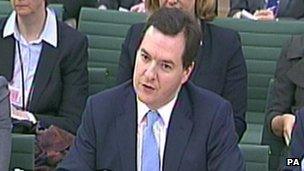Osborne: Please don't biff ring-fence
- Published
- comments

Mr Osborne was grilled on how he plans to reform the structure of banks
Which of us can stand up and say, with credibility, that the institution that employs us is beyond reproach and needs no reform (a propos of nothing, I work for the BBC, in case you have forgotten).
The Bishop of Durham, about to become primate of the Church of England, may never have been tempted to make that claim.
But I was struck that after I tweeted his musings, that perhaps big banks should be broken up into smaller banks - so that if they go bust, they might not bankrupt the rest of us - there were a few "people-in-glass-houses" rejoinders tweeted back to me, to the effect that he should keep his holy masculine beak out of finance.
And although our biggest British banks have never yet had a female chief executive, Ana Botin runs Santander UK and Jayne-Anne Gadhia is the boss of Virgin Money - the banking equivalents of the diocese of Durham, perhaps, if not quite York or Canterbury.
I presume at some stage the Parliamentary Commission on Banking Standards, on which the Archbish-elect sits, might look at whether a slightly more equitable gender balance at the top of finance might encourage better behaviour.
Most would say this cultural issue sits squarely within the remit of the Commission, which was set up by the chancellor in the furore of the first disclosures of how leading banks set out to rig the important Libor interest-rate benchmarks.
But strikingly this central and important question of why banks were so prone in recent years to bend and break the rules barely got a look-in during today's grilling by the Commission of the chancellor.
To the evident discomfort of George Osborne almost the entire session was spent picking over the principle and detail of the way he is planning to reform the structure of banks, based on the recommendations of yet another commission, the Independent Commission on Banking, which was chaired by Sir John Vickers.
As you will recall, the central element of the Vickers/Osborne reconstruction of UK banks is that their retail operations, which look after our savings, should be insulated or ring-fenced from their investment banking activities.
The point of this significant but expensive and fiddly reorganisation, said Mr Osborne, was to give confidence to future chancellors that they could allow big broken banks to go bust, rather than feeling obliged, as Alistair Darling did in the case of Royal Bank of Scotland and HBOS in 2008, to rescue them at enormous cost to the taxpayer.
What matters, Mr Osborne insisted, is that the ring-fence, combined with so-called resolution procedures designed to expedite a dismantling of broken banks, will allow customers to get their money from bank ATMs, even when a bank is failing.
Only another banking crisis will prove beyond a reasonable doubt whether he's right (let's hope it won't come to that again for a while).
But although there have been extensive investigations of these plans by MPs on the Treasury Select Committee and by Lords on the Economic Affairs Committee, the Commission is having another go at picking over them.
Which worries an anxious chancellor, who pleaded with the MPs and Lords on the Commission not to throw out the ring-fence - on the basis that he has been slaving for two years to build a national consensus for it.
"Consensus, conschmensus" was broadly the reply of the parliamentarians.
The consensus might be an ass, they said. We assert our right to come to our own views about the best way to minimise the costs to British citizens of future banking crises, they added.
Which doesn't mean that the Commission will recommend the status quo ante, no change. With Lord Lawson, the Bishop of Durham and a clutch of Labour members on it, the pressure will be for a more radical and definitive separation of investment and retail activities - coupled, perhaps, with cutting the biggest banks down to size.
George Osborne knows this and fears this. And in occasional manifestations of tetchiness there was just a hint of regret that he had set up the Commission and asked the distinguished lawmakers for help in sanitising our enormous banks, while conspicuously failing to constrain their purview.